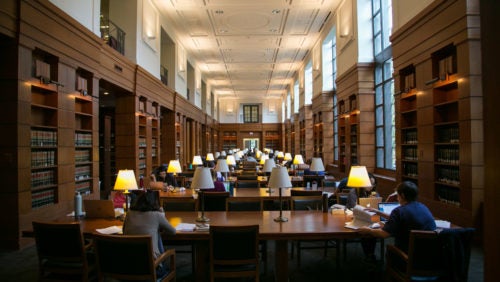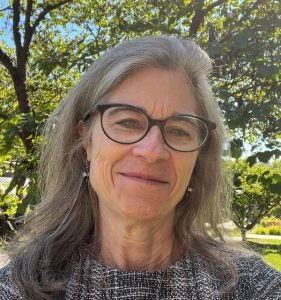Legal Writing Honors for Professor Kristen Konrad Tiscione, L’87
September 28, 2023

The Association of Legal Writing Directors (ALWD) and the Legal Writing Institute (LWI), the two leading membership organizations for legal writing academics, have awarded the 2024 Thomas F. Blackwell Award to Georgetown Law Professor Kristen Konrad Tiscione, L’87. The two organizations present the annual award “to a person who has made an outstanding contribution to improve the field of legal writing by demonstrating an ability to nurture and motivate students to excellence; a willingness to help other legal writing educators improve their teaching skills or their legal writing programs; and an ability to create and integrate new ideas for teaching and motivating legal writing educators and students.”

Professor Kristen Konrad Tiscione, L’87
Tiscione said she was “stunned” to receive the news of the award, and deeply honored to be recognized by her peers. After graduating from law school, she worked for several years as a litigation associate at Kirkland and Ellis, but felt herself drawn toward teaching. She started teaching legal writing part time at George Washington University Law School while still in practice and then joined Georgetown Law full time in 1994. Over the years, she has served as President of LWI, Secretary of ALWD and an Editorial Board member of the Journal of the Legal Writing Institute.
“I have devoted my career to the advancement of the discipline, both locally and nationally. So to have this award as a recognition of that effort and my years of service is amazing,” she said.
In a recent conversation, Tiscione reflected on the changes she has seen in the field of legal writing, both in academia overall and at the Law Center. When she was a first-year law student, her legal writing course was taught by an upperclass student, in a model known as a “law club,” a tradition dating back to the mid-nineteenth century. But by the time she was a 3L, Georgetown Law had hired its first professors of legal writing, and Tiscione was selected to help teach the 1L course as a student teacher.
Today, Georgetown Law has one of the nation’s most robust legal writing programs, having more than doubled the size of its legal writing faculty since Tiscione was hired. Upperclass students still have a role as Law Fellows, who help faculty provide 1Ls substantive feedback and advice – and continue to hone their own writing skills. Like Tiscione, many of the legal writing faculty at Georgetown are alumni who have returned to their alma mater to teach.
One of them is Associate Professor Jonah Perlin, L’12, who had Tiscione as a professor when he was a student and is now her colleague. “In her 1L classroom, Professor Tiscione helped me fall in love with legal writing, and as her Law Fellow in my 2L year, she taught me not just how to become a better legal writer but also how to become a better teacher of legal writing,” said Perlin. “She has inspired people like me to follow in her footsteps as we stand on her shoulders in training the next generation of lawyers.”
Part of what keeps her work fresh, Tiscione said, is keeping up with the ever-changing nature of how law is practiced. “When I was a law student, we researched in the books; there was one computer in the library,” she recalled. “That quickly turned into computers on every desk, and now virtually all legal research is done online. From traditional memoranda to email to filing digital briefs, we are always adapting for the benefit of students. Today, the big unknown for law practice is generative AI.” She’s excited to learn more about its implications for teaching and assessing legal writing and for legal education in general.
“I represent one of many Legal Practice faculty dedicated to preparing students to engage in the practice of law as it exists today,” she said.